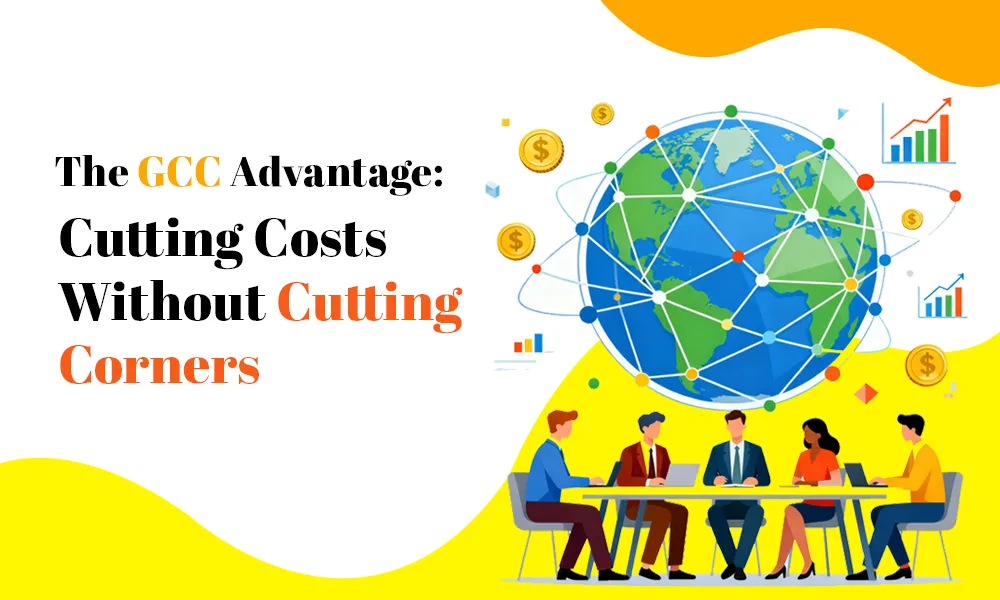If you lead a midsize business in today’s economy, you are probably facing the usual mix of challenges: skilled labor shortages, costly overheads, output or operational quality issues, and a lack of infrastructure for (or just a lack of) cloud-based teams, SaaS management, and remote collaboration.
It’s a lot – we get it – especially for growing businesses with global aspirations or established businesses looking to take their presence online.
This kind of digital transformation – setting the overarching objectives such as product launches, market visibility, lead generation, or customer retention – essentially requires outcome-based partnerships that oversee revenue impact, brand authority, and customer experience successfully.
It is not the cup of tea for traditional outsourcing anymore, with its output-based vendor model. Enter Remote Resource®, your outcome-based global capability center in India, and then some!
First Things First – Global Capability Centers are Partners, Not Vendors
Whenever you own or are the person responsible for managing or administrating a company – regardless of its size, location, scope of operations, etc. – you must delegate the execution of work according to the business goals of your product offerings or line of services.

Now, if you outsource to a vendor, your business goals are translated to a page of ‘brief,’ which the account manager of the external agency now owns as the main point of contact, or a single-thread owner (STO).
In simple words, this is bad news. Why? Because agencies have their own processes and quality standards to handle the execution while they juggle multiple clients. This means less accountability, visibility/transparency, and dedication to your work or goals, or both.
On the other hand, meanwhile, when you assign work to global capability centers, you are directly dealing with both the people and the processes that are chosen by and accountable to you. In essence, you retain virtual ownership over your goals and methods.
Staffing vs. Ownership: How Our Cloud Enablement Acts as Global Capability Centers Bridging the Gap?
Cloud staffing, or employee-as-a-service (EaaS), call us what you may. We are the guys getting your work done by enabling strategic in-house capability-building, helping you to shift your value from just “body-shopping.”
Let’s break down the jargon to tell you exactly what we mean – think of body shopping as Airbnb-ing and global capability centers as home ownership. When you outsource, or “body shop,” you rent employees who remain on your vendor payroll with a shifting allegiance – they can leave, operate in risky compliance and legal grey areas, or have hidden conflicts of interest.
But when cloud staffing – meaning companies with cloud-enabled, global, skilled talent pools, with cloud-first infrastructure essential in today’s supply chains – provides you with capability teams, you are sure to own both direction and output.
We at Remote Resource® do just that – we do not ‘rent’ our employees to you. We provide you with a pool of talent from which you can pick, vet, and choose already triply pre-vetted CVs of ex-Fortune 500 talent and build an offshore team like your own department that is exclusively dedicated to you while remaining fully capable of scaling as per your needs.
In this way, we provide you with the infrastructure, like:
- regulatory compliance,
- intellectual property,
- human resources,
- information technology,
- payroll,
- legal,
- remote collaboration tools,
- along with on-demand hiring
that gives you flexibility and transparency at less than half the cost of setting up physical, offshore global capability centers or outsourcing to cheap vendors who cost you in the long run.
Our unique model of EaaS empowers you to have an extension of your business by working with full-time equivalent cloud staff who are embedded into your organization’s culture, dedicated to understanding your workflows, and measured by key performance indicators (KPIs) set by you.
Sector-Specific Use Case: Traditional, Midsize, Midwest US Agribusinesses
This is not a “how to set up a global capability center in India” guide; rather, it is a list of benefits you can look forward to by partnering with global capability center planning and execution companies, even if you are not a tech-first or multinational business yet.

For Midwest farmers and agribusinesses, a global capability center company in India isn’t just about saving money – it is about making operations smarter and more reliable.
Imagine a team in India using satellite images and IoT sensors to track soil health, weather patterns, and crop growth. They can predict yields early, so you know exactly how much you’ll have to sell and store them. That means less waste and better planning.
Logistics is another big win. A global capability center strategy can look at shipping routes, freight costs, and port options worldwide to figure out the fastest and cheapest way to move crops abroad.
Procurement is getting simpler too. The global capability center services can handle supplier contracts, price negotiations, and compliance checks across markets.
Put simply, an Indian Global Capability Center can help Midwest agriculture move from guesswork to data-driven decisions, making farming supply chains more efficient, global, and resilient.
Rethinking Value in Post-Cost Economies: How India Global Capability Center Consulting Help?
Global capability centers in India are quietly taking the place of outsourcing in global supply chains, where it was already a favored destination.
Why? Both because of talent-dense locational advantages as well as the global capability center operating model, which combines cost-efficiency – no longer the top priority of growth-focused businesses, as per research – with integrated capabilities, centralized ownership, accountability, and control.
These attributes help ensure quality, compliance, demand planning, risk diversification, and decision-making – all future-proofing growth strategies – by leveraging data analytics, the internet of things (IoT), blockchain, cloud ERP (enterprise resource planning), artificial intelligence, and machine learning forecasting.
This model of global capability centers advisory firms also proactively prevents companies from falling into the vendor lock-in trap – the biggest con of traditional outsourcing – as it bleeds more resources in terms of time, energy, and long-term revenue generation and profit maximization.



